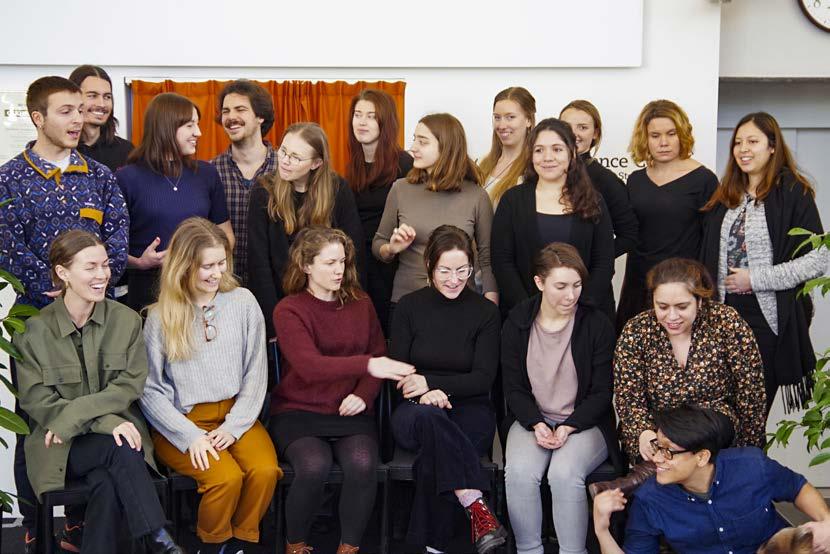
12 minute read
Education
2019 saw the launch of new education programmes and a number of improvements to existing ones
PHOTO: M. HUITRIC
Advertisement
THE CENTRE'S independent courses allow students from a diverse range of academic and professional backgrounds to engage with what the SRC does. The Världens Eko course continues to attract students with thought-provoking lectures on sustainability. The online course Introduction to Sustainability Science allows students from near and far to study at the centre. The number of applicants far exceeds the number of spaces on the course. Finally, the course Urban Social-ecological Systems brings academics and practitioners together in discussing and developing urban projects around Stockholm City, providing a rewarding balance of learning and practice for all.
on multidisciplinary and practical urban planning and collaboration. The courses bring together 25 of the brightest students from Nordic-Baltic universities on urban development. As part of the fi rst course, they worked together on a real-life planning case, taking on the challenge of developing sustainable cities. This year, the course focused on a district located south-west of Tallinn, characterised by Soviet-period housing, diverse ethnicity and ageing dwellers. Special emphasis was placed on improved health and wellbeing and their link to nature-based solutions. Overall, the three courses emphasise interaction and co-creation of knowledge and give the students the chance to build vital new networks both with fellow students as well as with experts and practitioners within the fi eld.
Together with partners in Finland, Latvia and Estonia we launched the fi rst of three intensive four-day courses focusing on multidisciplinary and practical urban planning and collaboration. The courses bring together 25 of the brightest students from Nordic-Baltic universities on urban development. Together with partners in Finland, Latvia and Estonia we launched
Master’s programme in Social-ecological Resilience for Sustainable Development (SERSD) Students from our master’s programme continue to work through their courses while also contributing to SRC activities. During the UN COP25 meeting in Madrid in December 2019, students Chris Vettos, Kristen Lindström, Nadja Najjar, Naomi Terry and Nick Fitzpatrick provided social media updates from the summit. The second-year students started work on their master’s theses, covering a range of topics and cases from across the world. As always, we look forward to their results in the coming year. This year, Stockholm University also launched a mentoring programme to help alumni and students network and boost opportunities to make personal and professional contacts. Already, current students have connected with former students who are now working in academia, the Swedish Society for Nature Conservation and the Swedish Ministry of Foreign Affairs, to name a few. We hope that this programme will support our students as they take their next career steps, and we look forward to learning how SERSD and the SRC have supported past students in their professional lives and how we can further develop this support.
The Resilience Research School Autumn 2019 was a busy period for the PhD programme coordinators and administrators. The Stockholm Resilience Centre became the fi rst department at Stockholm University to have its PhD programme evaluated. The assessment was part of the process to ensure and develop the quality of Stockholm University’s higher education. A report was submitted to the university describing the overall programme design, courses, research environment, measures and processes to ensure high research standards. The report also provided an opportunity to review and refl ect on how we can improve our PhD programme. 2019 also saw the introduction of fi ve new promising PhD students: Alice Dauriach, Maganizo Kruger Nyasulu, Maria Schewenius, Arne Tobian, and Emmy Wassénius. We would also like to congratulate Victoria Bignet, David Collste, Johanna Hedlund, Jennifer Hinton, Jean-Baptiste Jouffray, Katja Malmborg, Matilda Petersson, Luigi Piemontese and Jessica Spijkers for successfully defending their licentiate theses this year. 2020 looks set to become an exciting year, with eight PhD defences planned.
Introducing the 2019 PhD class
Alice Dauriach How do financial markets, large corporations, and financial secrecy interact with the earth system at a global level? Alice Dauriach’s project will uncover if and how financial secrecy enables the pursuit of environmentally damaging economic activities, with the risk of disrupting critical biomes and eroding the resilience of the biosphere. Secrecy jurisdictions (or “tax havens”), allow a degree of opacity in global financial markets, which undermines the enforcement of regulations, the tax revenue of nations and the accountability of government officials. This may ultimately reduce the ability of countries to democratically govern the use of natural commons and to lead the transformation to sustainability in the context of Agenda 2030. The thesis is a collaboration between the GEDB Programme at the Royal Swedish Academy of Sciences and the Stockholm Resilience Centre.
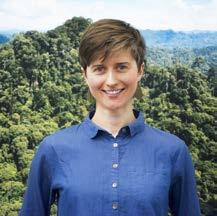
Arne Tobian
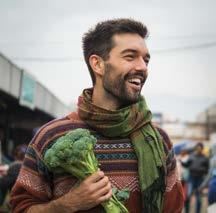
How far can we push the planet? The planetary boundaries framework is an intriguing concept that aims at depicting the outer limits of tolerable change to the earth system. But how tight are these different aspects of the earth system interlinked, what feedbacks take place and how would the safe operating space for humanity look if the interactions among individual planetary boundaries were taken into account? Computer models, like the dynamic global vegetation model LPJmL can help provide a better grasp and understanding of how these interactions could look. How strong are they? What happens to the state of other boundaries if one is transgressed? Are there regional differences? Arne Tobias’s thesis, carried out in collaboration with the Potsdam Institute for Climate Impact Research in Germany, is part of the Earth Resilience in the Anthropocene project and is inspired by the questions raised above.
Emmy Wassénius We often hear that we need a food system transformation to change the way we produce and consume food. However, research on food production systems remains siloed within agriculture, animal farming, aquaculture and fishing. In her PhD, Wassénius attempts to break out of this by addressing the global food system as one interconnected system. The project explicitly focuses on the risks to sustainability and human health present in the current system. Using systems lenses such as diversity, connectivity and feedbacks, she addresses emergent risks from our increasingly globalised and highly connected food production system. A global scale lens helps piece together the implications of a global system on local producers and consumers. It also highlights the variation that exists within food production. Food production is practised both by small-scale, rural farmers and fishers but also in high-tech industrial systems owned by transnational corporations. This variety, both in practices and risks, is one of the complexities we face when trying to understand and change the current system. The project is organised under the GEDB programme at the Swedish Royal Academy of Sciences.
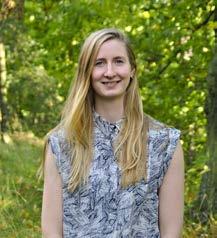
Maganizo Kruger Nyasulu
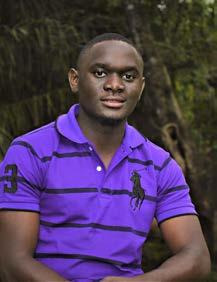
Attaining the Sustainable Development Goals (SDGs) of eradicating hunger and securing sustainable food for all by 2030 constitutes a major global challenge, particularly in sub-Saharan Africa (SSA). Here, malnourishment, poverty and population growth are the highest in the world, in regions subject to extreme water variability and scarcity. A key question is how much water is required and available to attain the SDGs in SSA now and in future climatic conditions? Nyasulu’s project analyses how much green water (infiltrated rain in soil supporting rainfed farming) is available and needed for sustainable intensification of agriculture in SSA. This is a critical knowledge gap since the SDGs neglect the link between water, food and sustainability. Blue water in irrigation tends, wrongly, to be seen as the path to delivering dramatic increases in food. Based on this Nyasulu will analyse green water management potentials and produce a map of the green/blue water index for SSA. It will be the first attempt at exploring water resilience, and on how to maintain capacity of landscapes to generate ecosystem services and moisture feedback. His research is carried out in collaboration with researchers at Potsdam Institute of Climate Impact Research and US Geological Survey.
Maria Schewenius
How can XR technologies and AI be used as an integrated part of an “urban tinkering” approach to plan and design for urban resilience? Emerging digital technologies offer new possibilities for collecting, analysing and visualising environmental data (environmental intelligence). The development is taking place while cities are both experiencing local effects of the increasing changes to the global earth systems and are the drivers behind many of the changes. Cities have the power to become hubs for desirable social-ecological transformations. However, urban planning is in need of new tools to facilitate the inclusion of more groups and perspectives in the planning process, for supporting transformations of urban landscapes for sustainability. Schewenius’s project will focus on augmented reality and virtual reality (AR and VR, respectively) which together are known as extended reality technologies (XR), and artificial intelligence (AI). It will explore which new opportunities and limitations the technologies offer, or do not offer, in different urban contexts for promoting complex adaptive systems thinking and green, blue and grey innovations, in an almost playful approach known as urban tinkering. The project is carried out in collaboration with the University of Gävle and the University of Exeter.
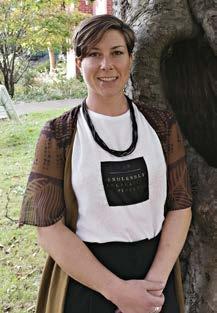
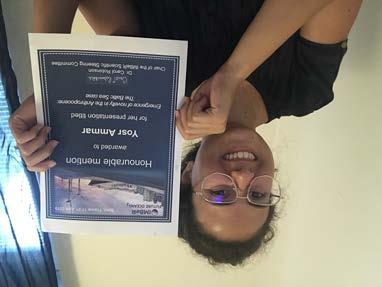
Current PhD student Yosr Ammar received an award as one of the top 10 early career presentations during the Future Oceans2 Integrated Marine Biosphere Research conference in June 2019 in Brest, France.
Executive programme in resilience thinking
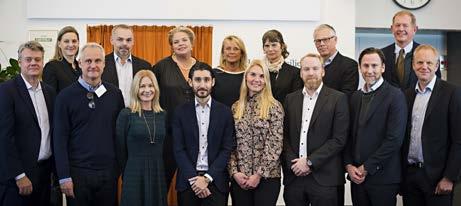
OUR EXECUTIVE PROGRAMME in Resilience Thinking ran for a second time, connecting CEOs and board members of large companies to sustainability scientists and experts. This commissioned education programme was well-received by the participants in 2018, and the interest in 2019 was even higher, with more applicants than the course could take in. A novelty this year was that two alumni from 2018 came Participants 2019/2020, from left to right: Mats Rahmström (CEO Atlas Copco), Sofia Svingby (VP sustainability Atlas Copco), Magnus Billing (CEO Alecta), Henrik Furhoff (CEO IPCO). Sara Öhrvall (chief digital customer experience and communications officer, SEB), Lotta Lyrå (CEO Clas Ohlson), Freddy Sobin (CEO KICKS), Magdalena Gerger (CEO Systembolaget), Malin Sandquist (director corporate, public and legal affairs, Systembolaget), Siv Malmgren (CEO John Mattson Fastigheter), Staffan Pehrson (CEO Nefab), Jerker Johansson (executive chair Blue Water Energy), Klas Balkow (CEO Axfood), Marcus Wallenberg (chair FAM, SAAB, SEB and Patricia Industries), Jonas Samuelson (CEO Electrolux).
back as lecturers, to share how they work towards sustainability – Henrik Henriksson (CEO, Scania) and Karl-Henrik Sundström (CEO Stora Enso).
Read more: www.executive.stockholmresilience.org
BALTICLEAD
The BALTICLEAD programme is a leadership programme funded by the Swedish Institute and hosted by the centre. It is designed to enable participants to address some of the world’s biggest social and ecological challenges and explore opportunities to build globally relevant solutions
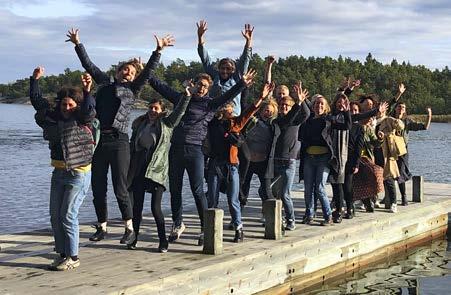
the 2019 BALTICLEAD programme. The participants, including CEOs, founders, academics, NGO leaders and more, brought a wide range of experiences to the two modules of this year’s BALTICLEAD programme. The programme is a colearning experience based on SRC’s research and the participants’ own expertise, and is designed to enable participants to address some of the world’s biggest social and ecological challenges and explore opportunities to build globally relevant solutions.
Centre researcher and director of BALTICLEAD, Per Olsson emphasises the importance of bringing these participants together, “We contribute with insights from our research and particularly the importance of linking humans and the environment when dealing with innovation that can have an impact at scales that matter in the Anthropocene. It is the participants’ individual expertise, shared knowledge and potential impact of the network they themselves create that facilitate opportunities for societal impact and transformation”.
The scientific and social-ecological backbone of BALTICLEAD is mixed with tools and concepts useful in entrepreneurial contexts. Over the course of the programme, the participants took part in intensive workshops, presentations, dialogues, games, networking and site visits. Being part of the network is considered a strong source of inspiration to the participants, in learning how to create a safe operating space for both people and planet. “We deliberately design for this, by facilitating learning both on an individual level and for the group as a whole, and by encouraging and fostering networks of change-makers that can achieve transformations towards regenerative futures,” Per Olsson says.
Nicole Chabaneix Adaptive co-management for local water resilience: the case of community-led ecosystem-based adaptation in the Peruvian Andes
David Enarsson Grassroots niches transforming cities toward post-growth futures: A case study of the collaborative economy in Gothenburg, Sweden
Melissa Ingaruca Synergies of radical paradigms and emerging technologies in knowledge production for transforming the modernist urban design. A focus on artificial intelligence, extended reality and sensor technology
Krisztina Jónás Beyond 'common sense': unveiling human behavior in nudging and affordance theory and how it informs social-ecological transformation theory
Jenny Kaleinek Exploring change agent strategies in navigating transformation towards safe and just agri-food systems in South Africa - A case study of the SPAR Rural hub project
Frida Lager Ain’t our business? A study of transnational climate change impacts on Swedish consumption through the lens of Brazilian soy
Sofia Maniatakou Unraveling diverse values of ecosystem services: a socio-cultural valuation using the Q-methodology in Messenia, Greece
Vivika Mäkelä Pedagogy and Human-Nature Connection: A case study of two pedagogical approaches and their relation to pupils’ human-nature connection in northern Mato Grosso, Brazil
Felix Nasser Climate-smart cocoa in Ghana: Examining discourses, trade-offs and implications for cocoa smallholders
Moa Olsson Exploring Social-Ecological Response Capacity to Drought of Swedish Farms
Sophie Plitt Digital Tools for Urban Green Infrastructure: Investigating the potential of e-tools to inform and engage stewards
Ivan Simon Kallstenius Patterns of Collaboration for Sustainability in the Global Clothing Industry
Licentiate theses Victoria Bignet Social-ecological approaches for assessment of healthy diets from sustainable food systems
David Collste Navigating towards the Safe Operating Space: Systems thinking and the SDGs
Johanna Hedlund No environmental problem is an island: Aligning networks of transboundary collaboration to complex policy issue interdependencies
Jennifer Hinton Profit-Orientation and Post-Growth Economies: Building Theory for SocialEcological Resilience
Jean-Baptiste Jouffray From Corals to Corporations: Socialecological dynamics in the Anthropocene ocean
Katja Malmborg How on Earth: Operationalizing the ecosystem service
Matilda Petersson Non-state actors and global fisheries governance
Luigi Piemontese Global and continental perspectives on the sustainability of future agricultural water management
Jessica Spijkers Identifying Global Patterns of International Fisheries Conflict










